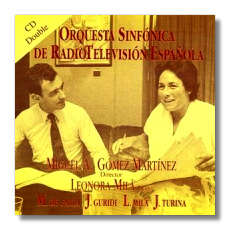
The Internet's Premier Classical Music Source
Related Links
- Latest Reviews
- More Reviews
-
By Composer
-
Collections
DVD & Blu-ray
Books
Concert Reviews
Articles/Interviews
Software
Audio
Search Amazon
Recommended Links
Site News
 CD Review
CD Review
Spanish Radio & Television Orchestra - 25th Anniversary

- Joaquín Turina: Sinfonia Sevillana
- Jesus Guridi:
- Ten Basque Melodies
- An Adventure of Don Quixote
- Manuel de Falla: Nights in the Gardens of Spain
- Leonora Milà: Piano Concerto #2
Leonora Milà, piano
Spanish Radio & Television Orchestra/Miguel Gomez Martinez
Regis Tro 002 2CD 107min
Milà is an adequate, if unexciting soloist in the Falla. There are considerably better recordings by De Larrocha and Rubinstein – particularly the latter's version with Enrique Jorda. Listening to Regis Tro's recording is a bit like watching a tennis match. The piano is first heard in the left channel, where is almost completely smothered by the orchestra. It abruptly jumps to the right about half way through I. After a few more visits to each side of the acoustic space, the instrument settles down on the right – until the very end of III, that is. Several swishes and ticks lead me to wonder whether the Falla was dubbed from a noisy LP. Ms Milà's own pointlessly dissonant and monotonously mechanical concerto is a poor imitation of Prokofieff, with some Bartók and Hindemith thrown in for good measure. The notes contend that Jesus Guridi's transcriptions of Basque folk tunes are superior to Liadov's Eight Russian Folk Songs, but Guridi lacks Liadov's inspiration, dramatic sense, and ear for orchestral color. Guridi's Quixote piece is equally undistinguished. Turina's Sinfonia Sevillana, on the other hand, is simply glorious. Mr. Gomez Martinez is obviously a talented conductor with tremendous sympathy for the Spanish idiom. Alas, his orchestra is provincial and not terribly polished. The strings are weak and the brass are too often out of tune. Antonio de Almeida's RCA recording of the Turina (reviewed by Don Vroon in September/October 1992 American Record Guide) on a single disc is a much better buy. In addition to the problems already noted in the concerto recordings, the sound is miserable and irritating: hissy (despite the DDD designation, it sounds like AAD to me), harsh, and brittle. These recordings were made 1987, in honor of the orchestra's 25th anniversary in 1990!
Copyright © 1996, Thomas Godell


















